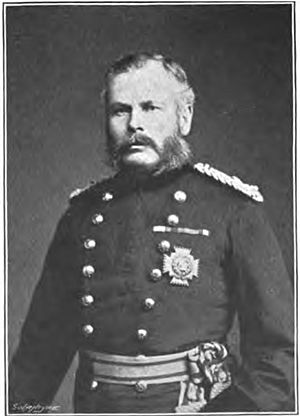Charles George Arbuthnot facts for kids
Quick facts for kids
Sir Charles Arbuthnot
|
|
|---|---|

Sir Charles Arbuthnot
|
|
| Born | 19 May 1824 Killaloe, Ireland |
| Died | 14 April 1899 (aged 74) |
| Allegiance | |
| Service/ |
|
| Rank | Lieutenant General |
| Commands held | Bombay Army Madras Army |
| Battles/wars | Crimean War Second Anglo-Afghan War Third Anglo-Burmese War |
| Awards | Knight Grand Cross of the Order of the Bath |
Sir Charles George Arbuthnot (born May 19, 1824 – died April 14, 1899) was an important officer in the British Army. He started his career in the Royal Artillery and fought in the Crimean War. Later, he became a very senior leader in British India.
Contents
Early Life and Education
Charles Arbuthnot was born on May 19, 1824. He was a twin! His father, Alexander Arbuthnot, was a bishop. A bishop is a high-ranking church leader. Charles had an older brother, Alexander John, who became a top government worker in India. His half-brother, George Bingham, was also a military officer in India.
Charles went to Rugby School, a famous school in England. After that, he studied at the Royal Military Academy, Woolwich. This academy trains people to become officers in the army.
Military Career Highlights
Charles Arbuthnot became a second lieutenant in the Royal Artillery on June 17, 1843. This was his first step as an army officer.
Fighting in the Crimean War
He served as a captain in the Crimean War. This war was fought between 1853 and 1856. Charles was injured twice during battles near a place called Sevastopol in 1855. He was recognized for his bravery. He received an award called the Companion of the Order of the Bath. This award is given for excellent service. Over time, he received even higher levels of this award, becoming a Knight Grand Cross.
Service in India
In 1868, Arbuthnot moved to India. He was involved in the Anglo-Afghan War. This was a conflict involving Britain and Afghanistan. While in India, he married Caroline Charlotte Clarke in 1868.
Leadership Roles in England
When he returned to England in 1880, Arbuthnot took on several important jobs. He became the deputy leader for artillery, then the inspector-general of artillery. He also led a committee that dealt with military supplies. People respected him for being fair and strong in his leadership.
Return to India and Final Years
Arbuthnot went back to India in 1886. He became the Commander-in-Chief of the Bombay Army. Later that year, he became the Commander-in-Chief of the Madras Army. These were very important positions, meaning he was in charge of large parts of the British army in India. He worked as a senior military advisor until 1890. In 1893, he was appointed Colonel Commandant of the Royal Artillery.
Later Life and Family
Sir Charles Arbuthnot passed away on April 14, 1899. He left behind his wife and children. One of his sons, Alexander George Arbuthnot, also became a high-ranking army officer. His grandson, Charles Crombie, became a famous pilot in the Second World War.
 | Selma Burke |
 | Pauline Powell Burns |
 | Frederick J. Brown |
 | Robert Blackburn |

